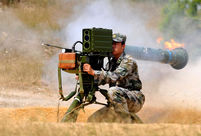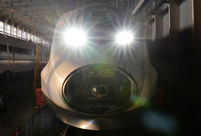 Shocking moments when PLA's weapons open fire
Shocking moments when PLA's weapons open fire Famous Lanzhou beef noodles
Famous Lanzhou beef noodles Armed Police hold anti-terrorism drill in SE China's Xiamen
Armed Police hold anti-terrorism drill in SE China's Xiamen Harbin Int'l Ice and Snow Festival opens
Harbin Int'l Ice and Snow Festival opens 'Jin' named the word of the year by cross-strait netizens
'Jin' named the word of the year by cross-strait netizens Chinese scientific expedition goes to build new Antarctica station
Chinese scientific expedition goes to build new Antarctica station
 Chinese naval escort fleet conducts replenishment in Indian Ocean
Chinese naval escort fleet conducts replenishment in Indian Ocean 17th joint patrol of Mekong River to start
17th joint patrol of Mekong River to start China's moon rover, lander photograph each other
China's moon rover, lander photograph each otherTEHRAN/BRUSSELS, Jan. 12 -- Iran and the so-called P5+1 group agreed on Sunday to start implementing the earlier inked interim deal on the former's nuclear program on Jan. 20. However, the tough road ahead leaves no room for complacency.
The agreement on the date was reached after coordination between Iran and the United States, Britain, France, Russia, China and Germany, Iran's official IRNA news agency reported Sunday.
European Union (EU) foreign policy chief Catherine Ashton, who represented the P5+1 in the talks, confirmed the date in a statement. The International Atomic Energy Agency (IAEA) will now be asked to help monitor and verify the implementation.
Iran and the EU held a meeting in Geneva on Thursday and Friday to discuss matters pertaining to putting the interim deal into practice, with issues such as Tehran's advanced home-made centrifuges continuing to be a bone of contention.
The deal was first reached with the P5+1 countries in Geneva on Nov. 24, 2013, whereby Iran agreed to curb parts of its nuclear activities for six months in exchange for the easing of sanctions, and to pursue a comprehensive deal through further negotiations.
In a parallel deal, Tehran would allow more frequent inspections of its nuclear sites by the IAEA. However, on Sunday Iran dismissed Western media reports that the nuclear watchdog would set up a temporary monitoring office in the country.
The agreement on the first-stage implementation was immediately applauded by U.S. President Barack Obama, a leading believer in Tehran's nuclear weaponry ambition, which Israel -- Washington's closest Middle East ally -- fears the most.
Calling Sunday's agreement "concrete progress," Obama warned against any additional sanctions on Iran the Congress might impose with the aim of revving up pressure on the country. Tightening the screw now would in fact ruin the hard-won achievement, he said.
Secretary of State John Kerry admitted that the next phase of talks would be very difficult. "We are clear-eyed about the even greater challenges we all face in negotiating a comprehensive agreement," he said.
The cautiousness stems from the deep-rooted mistrust between Iran and the West evident in years of inefficient negotiations. It was not until Iran's new moderate President Hassan Rouhani came to office in August 2013 that Tehran appeared willing to repair its ties with the West at the price of some nuclear activities.
However, Iran remains unshakable as far as their peaceful nuclear right is concerned. Head of Iran's nuclear agency, Ali-Akbar Salehi, said Saturday that carrying out research and using advanced home-made centrifuges were Iran's indispensable rights.
As the Geneva deal comes into force, Iran is expected to soon receive the first tranche of some 550 million U.S. dollars -- possibly in early February -- as part of a total of 4.2 billion dollars of Iranian revenues currently held abroad.
The payment will be distributed in almost even batches in six months' time, and will depend on Iran's commitment to diluting half of its 20 percent enriched uranium to no more than 5 percent, said an U.S. official.
 In photos: Ten 'tuhao' devices in 2013
In photos: Ten 'tuhao' devices in 2013 College students saved from an ice hole by brave citizens
College students saved from an ice hole by brave citizens Gallery: Top 10 box office hits in 2013
Gallery: Top 10 box office hits in 2013 Beautiful churches around the world
Beautiful churches around the world Yang Mi, Hawick Lau hold wedding in Bali
Yang Mi, Hawick Lau hold wedding in Bali 'Phubbing' people seen everywhere
'Phubbing' people seen everywhere World's biggest snack shop in China
World's biggest snack shop in China Shocking moments when PLA's weapons open fire
Shocking moments when PLA's weapons open fire World's fastest train CRH380A assembled in E China
World's fastest train CRH380A assembled in E China Top 10 box office hits in 2013
Top 10 box office hits in 2013 In photos: Ten 'tuhao' devices in 2013
In photos: Ten 'tuhao' devices in 2013 Real estate tycoon measures PM2.5
Real estate tycoon measures PM2.5  'I am on a journey to lose weight'
'I am on a journey to lose weight' 'Cute' artifacts exhibited in Nanjing Museum
'Cute' artifacts exhibited in Nanjing Museum Advanced Chinese weapons that stepped into spotlight in 2013
Advanced Chinese weapons that stepped into spotlight in 2013Day|Week|Month